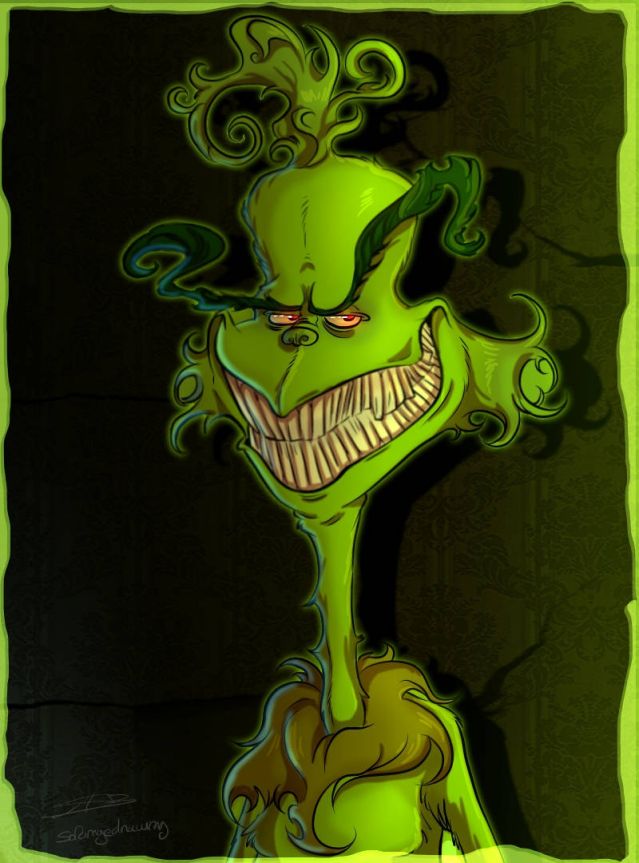OCD
Don't Be the Grinch!
Unwrapping OCD's greatest fear for the holidays.
Updated December 6, 2023 Reviewed by Monica Vilhauer
Key points
- The expectations of the holidays can be a big trigger for those with OCD.
- Embracing the Grinch helps OCD sufferers tolerate and embrace all their feelings and thoughts.
- Exposure-Response Prevention and Internal Family Systems both support opening up to your inner Grinch.

It's hard to love the Grinch, but secretly I've always found him charming. Equal parts sour and selfish, he's like a good Old-Fashioned served on the rocks. Moody, audacious, and bittersweet; he's everything I felt it impossible to be. How liberating to not care and do whatever you please!
Recall the Grinch lives alone on his mountain and, with a heart two sizes too small, he hatches a plan to end the noisy festivities of Christmas in Whoville once and for all. With his dog Max, he swoops into town as Santa, stealing all the presents, the food for the feasts, and even the Christmas tree itself.
For those of us who struggle with OCD, the Grinch is everything we most fear. Why aren't we more cheerful this time of year? How might we spoil the holiday for others with our own selfishness? Why must we ruminate when we should just be relaxing? Are we Grinches too?
These and other worries haunt us at this most happy time of year, and make us feel all the worse because it goes against the way we'd wish to see ourselves at all times: good, caring, and bright. We'd much rather be angelic and innocent Whos, not Grinches who are "as cuddly as a cactus, and as charming as an eel."
Individuals with OCD are actually fantastic foils to the Grinch. Recent research shows that those with OCD have enormous hearts—not exactly two-sizes too big, but naturally equipped with outsized empathy and concern for hurting or disappointing the ones they love. In contrast to the Grinch, they are exquisitely tuned in to others, so much so that it's hard to acknowledge their own contrasting feelings and thoughts. It's quite easy to judge or forget these aspects of oneself, and then, of course, worry in spirals. "Don't be the Grinch, don't be the Grinch," might run the inner monologue of OCD sufferers during the holidays.
But it should make you feel much better to learn that Theodore Geisel—good old Dr. Seuss— modelled the Grinch after himself. Stressed with his wife's continued health problems and dismayed by the increasing commercialization of Christmas, he looked in the mirror one December 26th and saw the Grinch clear as day. And I'm near certain that just that space for being a Grinch allowed him to connect to a part of himself he needed to recognize and perhaps even love.
If you have OCD this holiday, why not allow some more space for your inner Grinch to just be there? Who said you have to be ever joyful and happy this holiday season? Who says you can't sometimes feel anti-social, disinterested, or downright mean. It doesn't make you a Grinch, it makes you human.
There are two primary schools of thought on OCD treatment these days. The gold standard and most popular relies on exposure-response prevention. This means making room for your fear and anxiety without trying to take it away. So, if you worry and wonder about being a Grinch, allow it to be there for a bit, and try not to seek reassurance from someone that you're always a joyful resident of Whoville. Entertain the possibility that you just might sometimes be a Grinch.
Sing it with me with your best Boris Karloff voice: "You're a monster, Mr. Grinch. Your heart's an empty hole. Your brain is full of spiders, you've got garlic in your soul. I wouldn't touch you with a thirty nine and a half foot pole!" Only, allow yourself here to imagine there's no distance between you and the Grinch and you're just fine with that.
The second school of thought on OCD is Internal Family Systems. This approach stresses befriending all part of yourself as valuable and lovable. Surprisingly, this means giving extra love for the sides of your inner family who seem most unsavory and distressing to you—think of that annoying uncle or aunt that comes to visit on the holidays. Give some extra consideration and love to this side of yourself and engage some curiosity about what it needs. Does it need a little time to be by him or herself? Does it need freedom from any expectations to be happy, good, or energetic? Does it feel misunderstood by any other parts of yourself that like to keep it sidelined?
Allow it some voice, and again, if you need, sing along with Boris Karloff: "You have all the tender sweetness of a seasick crocodile! Given the choice between the two of you, I'd take the seasick crocodile."
And now, with a grin of those termites in your smile, be the Grinch for once. It just might make your holidays that much brighter!


